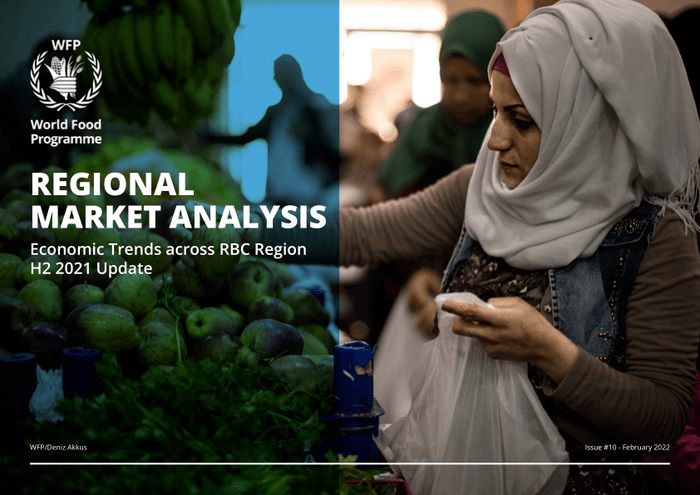Short after the slight recovery of economies in 2021, the region was further challenged by the conflict in Ukraine. According to the World Bank, the average regional GDP growth fell from 2.8 percent in 2021 to 2.2 percent in 2022.
Crude oil prices have been steadily increasing in 2022, the Europe Brent Spot Price recorded a monthly average of USD 123 /barrel in June 2022, up from USD 74 in June 2021. Increasing energy prices would benefit net oil exporting countries in the region such as Iraq, Iran, Algeria, and Libya, only if oil production levels remained at least the same. In terms of oil production, oil exporting countries increased their production levels between 2021 and the first half of 2022, except for Libya which witnessed a 20 percent drop in their oil production levels between H2 2021 and H1 2022.
The region, being highly dependent on food imports from the black sea, was directly affected by the conflict that resulted in trade and supply disruptions and global prices spikes of both food and energy. Lebanon keeps recording the highest annual food inflation rates (332 percent) in June 2022, not only in the region but among top three countries worldwide,
Türkiye recorded the second highest inflation rate in the region with nearly 94 percent annual food inflation rate in June 2022.
A comparison for the food basket cost in the region is feasible by converting the cost of food basket from local currency units into USD. Throughout the first half of 2022, Armenia, Libya, Jordan, and Türkiye reported the highest food basket cost in USD terms.
Comparing H1 2022 against its corresponding period in 2021, we observe that the cost of food basket in USD terms increased in most countries. This suggests that inflationary pressures surpassed the effect of currency depreciation. In Türkiye, the cost of food basket in Turkish Lira increased by 60 percent but this did not offset the sharp depreciation in the currency that went up from TRY 7.6 to TRY 14 per one USD in the first four months of 2021 and 2022.
Economic accessibility related challenges, through spiraling food and energy prices, are just one side of the coin. Physical availability of key staples is a global concern given that Russia and Ukraine comprise one third of global wheat exports, 20 percent of corn exports, and 80 percent of sunflower oil exports. Associated risks of food availability on each country in the region is subject to domestic production and stock levels, relative dependency on imports especially from the black sea, and ability to find and finance alternative trade sources. Armenia, Lebanon, Libya, Jordan and Yemen are at higher risk for relatively high wheat import dependency ratio and high share of sourced wheat imports from Russia and Ukraine.
Inflationary pressures imported from spiraling global food and energy prices, and further devaluation of the Egyptian pound will negatively affect the purchasing power of households, especially the vulnerable. Furthermore, accumulation of public debt and bleeding public finances could affect income levels of households through subsidies rationing or cutting and/ or revisiting public sector employment given that wages and compensation comprise nearly one fifth of total government expenditures, and/or higher tax rates. According to the World Bank April Economic update, enhancing public expenditure efficiency and revenue mobilization will be crucial to avail the fiscal space.
Securing Gulf funds and another IMF loan did not prevent further depreciation of the currency which first slid from EGP 15.7 per dollar to EGP 18.2 on the 21st of March, to depreciate further to EGP 18.8 per dollar by the end of June. Yet, the injection of hard currency at this critical time could withhold severe repercussions of the global and regional crises.
Governmental measures to boost local agricultural production along with diversification of trade supply sources could lessen spill overs of global food crisis. Reforms to enhance private investment, exports and FDI remain crucial for the economy’s resilience and competitiveness. Importantly, continuing to pursue structural reforms to unleash the private sector’s potential in higher value-added and export-oriented activities are necessary to create jobs, and improve living standards.


